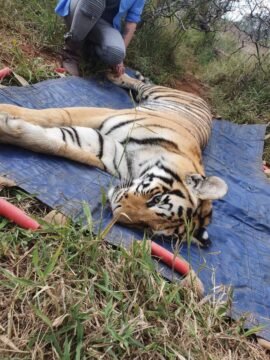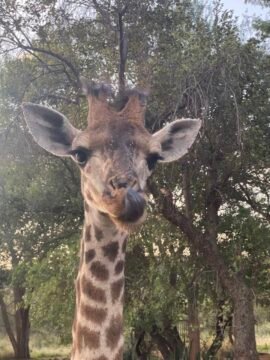Project Label: Ongoing
Marine Turtles are a successful group of animals that have witnessed the rise and fall of the dinosaurs. They have inhabited the earth for over 100 million years and survived in huge numbers until the recent past. They have evolved
The term “mangrove” refers not to a single species, but to a group of plants that share specific adaptations to thrive in these unique environments. Globally, about 80 mangrove species have been identified, with 28 species present in Sri Lanka.
Illegal trafficking of biodiversity is one of the most lucrative organised crimes worldwide. In Central Africa, many species are threatened by illegal trade at national and international level. The fight against illegal trafficking of species requires sufficient means for proper
A rhinoceros is a large herbivorous mammal known for its thick skin and one or more horns on its snout. There are five species: Black, White, Indian, Javan, and Sumatran.
The cruel canned hunting industry in South Africa isn’t just limited to lions – tigers are also victims. With a price tag of $35,000 to $40,000 per animal, these majestic creatures are highly sought after. Since tigers are not native
On March 2023, the Wild at Life e.V. team was notified of a young giraffe lying on his motionless mother. Upon arrival, the team learnt that the mother giraffe had been shot several days prior and the baby giraffe remained
Bandits, on the other hand, are involved in kidnappings and cattle rustling in the northwest region, while separatist groups are agitating for independence in the southeast region. The conflict has resulted in widespread violence, with communities caught in the crossfire
Wildfire The unfolding crisis needed critical attention and is rooted in the reality of life on a warming planet. Greece and Turkey are home to species that don’t live anywhere else on our planet. Roughly a fifth of Greece’s 36,000
Mission One Canned hunting is a fast-growing business in South Africa, where thousands of lions are bred in more than 160 farms to be shot by wealthy foreign trophy hunters. More captive lions (around 7,000) are now in the country
Collaring also helps reduce human-wildlife conflict by enabling conservationists to track lion movements and alert nearby communities when lions are in the area. This can prevent unintentional human-lion encounters, reducing the risk of conflicts that could result in injury or
With an estimated 415.000 elephants left on the continent, they are regarded as vulnerable, although certain species are being poached towards extinction. Adult elephants have only one predator – humans. We are directly (e.g. shooting, spearing, snaring, poisoning) and indirectly
The illegal wildlife trade in Nigeria is driven by a combination of demand for traditional medicine and food, as well as high-value species for the international trade in wildlife products. Nigeria’s porous borders and weak law enforcement result in a
The goal of this project is to ensure the implementation of enhanced welfare standards for Indonesian primates, with an initial focus on ending the exploitation of long-tailed macaques. Therefore, this project has a major focus on the dancing monkeys. This
Droughts can have devastating impacts on wildlife and agriculture, causing crop failures, food shortages, and increased food prices. They can also lead to water shortages, which can impact wildlife, human health, hygiene, and sanitation. Climate change is a global issue
Additionally, involving local communities in the conservation and management of wildlife can foster a sense of ownership and responsibility, reducing the likelihood of conflict. Tackling human-wildlife conflict requires a comprehensive approach that considers both the needs of humans and the
Human-Wildlife Conflict Mitigation Coexisting can be challenging, and with the human population continuously expanding, conflicts are inevitable. Lions, elephants, and other species are being shot, snared, or worst, poisoned, yet few killings are actually reported to local authorities around Africa.
The rehabilitation process can take months or even years, depending on the severity of the animal’s physical and psychological trauma. Once the animals are healthy and strong enough, they are often placed in sanctuaries or adopted into loving homes where
The Primate Freedom Project has three components: Education, Advocacy, and Support. The aim of the Primate Freedom Project is to save primates from American labs, as well as to advocate for the cruelty behind vivisections.
It contributes to climate change by releasing large amounts of carbon dioxide into the atmosphere and reduces the earth’s ability to absorb carbon dioxide. Deforestation also results in the loss of habitats for endangered species, such as the orangutan and






